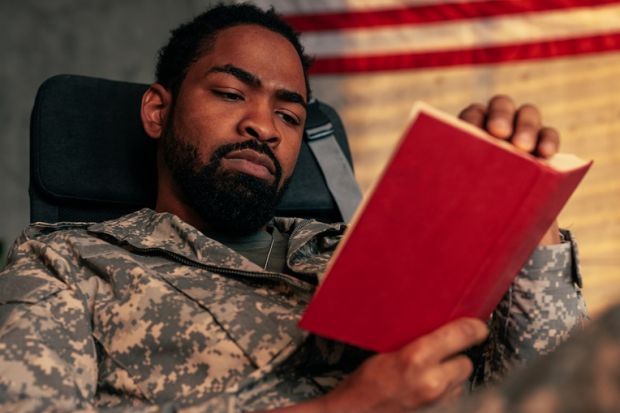The Australian Royal Commission into Defence and Veteran Suicide recently delivered its long-awaited final report, which provides 122 recommendations on how to improve health and well-being outcomes for the veteran community.
Some of those recommendations relate to how veterans can be better supported to make the transition into civilian life. This transition is often challenging, and research shows that higher education is a vital pathway to improve veterans’ well-being and career prospects. A tertiary qualification is likely to improve their employability, enhance their well-being and limit their reliance on government support.
The problem is that veterans face many barriers to attending university. Often, military qualifications and experience do not translate directly into university entry scores. Veterans might also lack study skills, feel alienated from civilian peers and find the cost of higher education prohibitive.
This is why current and former servicemen and servicewomen aged 20 to 59 are 20 per cent less likely to have a bachelor’s degree or higher qualification in Australia than those who have never served. This disparity is even more pronounced among younger age groups, with those aged 20 to 39 being 34 per cent less likely to have a bachelor’s degree or higher.
While veterans who want to study will likely qualify for standard forms of government support, they often have families and significant financial responsibilities, so the subsidies are not always enough. The subsidies are also subject to means-testing, which can factor in the earnings of partners or parents. Consequently, this support is unlikely to encourage a veteran to head for a university campus when they leave the barracks.
Alongside a handful of other Australian universities, the Australian Catholic University has been working to help address these problems. We have developed a veteran-specific Recognition of Prior Learning framework to acknowledge the training and skills acquired in the Australian Defence Force. The framework factors in service rank and training, giving credit in consideration of service, which reduces the time (and expenditure) needed to obtain a degree.
With the assistance of government grants, philanthropic donations and industry support, ACU has also pioneered a suite of programmes and courses to support veterans and their family members as they undertake study. We provide dedicated support officers, who are themselves veterans, and spaces on campus where student veterans and family members can meet, study and relax. And we connect our veteran students with industry partners, allowing them to receive mentoring and gain experience in the civilian workplace.
But more can and should be done at a national level, particularly around the lack of specific financial assistance for veterans. In my view, the federal government should consider introducing a home-grown GI Bill that allows the men and women who have served our country access to a free university education.
Something similar has worked in the US, where for more than 80 years the GI Bill has helped veterans pursue an education. Among the many benefits it provides to eligible veterans and their families is help with tuition costs and living expenses.
Recognising veterans and family members as a higher education equity group could be the first step in this direction, allowing them to attract specific funding support earmarked for such groups. This would also help universities implement strategies that attract and retain veterans by providing veteran-friendly support and consideration.
Income support for study should also be part of the package – not only for veterans new to university, but for those who want to undertake postgraduate study.
Those who have served Australia were willing to make significant sacrifices. Covering the cost of their education would be a meaningful way for us to show our respect and ensure that they have the opportunities they deserve.
Why should those who have served our country be asked to pay a debt when it is, in fact, our debt that must be paid?
Zlatko Skrbis is vice-chancellor and president of the Australian Catholic University.
Register to continue
Why register?
- Registration is free and only takes a moment
- Once registered, you can read 3 articles a month
- Sign up for our newsletter
Subscribe
Or subscribe for unlimited access to:
- Unlimited access to news, views, insights & reviews
- Digital editions
- Digital access to THE’s university and college rankings analysis
Already registered or a current subscriber? Login








